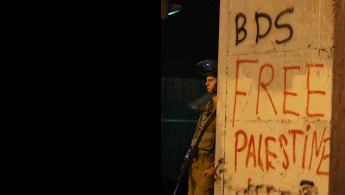Boycott, Divestment and Sanctions against Israel: What is BDS and why should you care?
At its core, the Boycott, Divestment and Sanctions movement (BDS) is a campaign promoting various forms of boycott against Israel until it meets its obligations under international law.
Led by the Palestinian BDS National Committee (BNC), BDS strives to uphold the principle that Palestinians are entitled to equal rights. Inspired by the South African anti-apartheid struggle and the US Civil Rights movement, its ultimate goal is the implementation of full equality for Palestinians.
Here's everything you need to know about it.
When did BDS start?
Palestinians have a history of holding strikes and boycotts that can be traced back to the 1920s, when they protested colonial British Mandate rule.
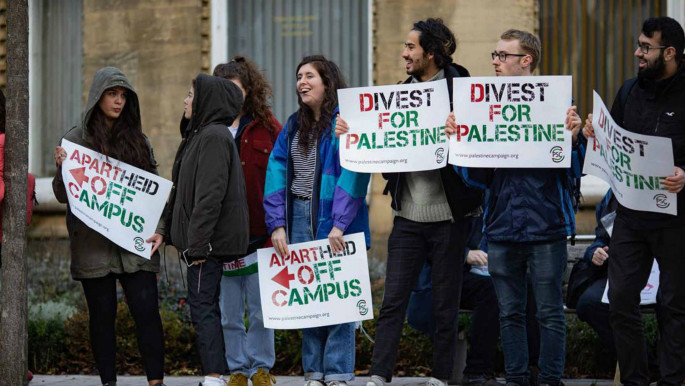 |
|
| Read also: Criminalising BDS shows us what Israel fears most |
During the second intifada in the early 2000s, international solidarity for Palestinians grew rapidly and by 2004, Palestinian-led calls for boycotts gained momentum when construction of the West Bank separation wall started.
Around this time, the Palestinian Campaign for the Academic and Cultural Boycott of Israel (PACBI) was formed, which subsequently became a BNC founding member.
According to the official BDS website, on 9 July 2005 the BNC – which consists of over 170 Palestinian civil society organisations, unions, and cultural and rights groups – came together to officially launch the BDS Call.
Omar Barghouti, one of the co-founders of both PACBI and BDS, said there were several key moments that led to that day.
"One of them is the International Court of Justice advisory opinion [exactly one year prior], condemning Israel's wall in the occupied Palestinian territory as illegal and calling on states to ensure its removal," he told The New Arab.
"Another moment was the UN's conference against racism in Durban 2001, when the NGO Forum of the conference condemned Israel's apartheid and called for punitive measures against it.
"Another was the decision by the Association of University Teachers in the UK, in April 2005, to endorse the academic boycott of Israel."
Barghouti said the "most important moment" was when Israeli forces re-invaded Palestinian cities and refugee camps in the West Bank during the second intifada and committed a massacre at Jenin refugee camp.
"All these, among other, moments convinced the absolute majority of Palestinian unions, political parties, mass movements and organisations… that we must adopt a new strategy of resistance that organically and creatively connects our internal popular resistance," he said.
 |
All these, among other, moments convinced the absolute majority of Palestinian unions, political parties, mass movements and organisations… that we must adopt a new strategy of resistance that organically and creatively connects our internal popular resistance |  |
What are the goals of BDS?
According to its website, BDS aims to end international complicity in the Israeli regime of occupation, apartheid and settler colonialism through peaceful protest and grassroots campaigning.
It does not advocate for any particular solution to the ongoing Israel-Palestine conflict and does not call for either a "one state solution" or a "two state solution".
Instead, it focuses on achieving basic human rights through targeted strategies that aims to pressure Israel to comply with international law. These are:
1. Ending its occupation and colonisation of all Arab lands and dismantling the separation wall. International law recognises the West Bank, including East Jerusalem, Gaza and the Syrian Golan Heights as occupied by Israel.
2. Recognising the fundamental rights of Palestinian citizens of Israel and granting them full equality.
3. Respecting, protecting and promoting the rights of Palestinian refugees to return to their homes and properties as stipulated in UN resolution 194.
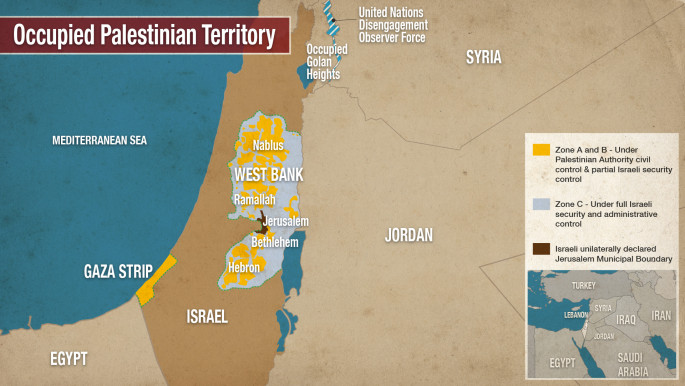 |
|
Do Palestinians actually support BDS?
The 2005 call for BDS is endorsed by all major political parties, trade union federations, refugee rights associations, academic unions, farmers' organisations, cultural centres, NGO networks, women's unions, youth movements and others.
The signatory organisations to the 2005 call represent Palestinians living in the West Bank and Gaza, Palestinian citizens of Israel, and Palestinians in the global diaspora.
The BNC believes the BDS call is the most widely supported document in the last few decades of Palestinian history.
The BNC said it was patronising to argue against BDS based on the belief it destroys employment for Palestinians – especially workers who have borne the brunt of Israel's ongoing destruction of their industry and economy.
The BNC said the wide support for BDS among Palestinians, including workers' unions, indicates that people believe any economic damage is a small price for justice and equality.
How effective is BDS?
BDS's effectiveness on the Israeli economy is hard to determine, and largely depends on the study you rely on to measure its effects on its exports and industries.
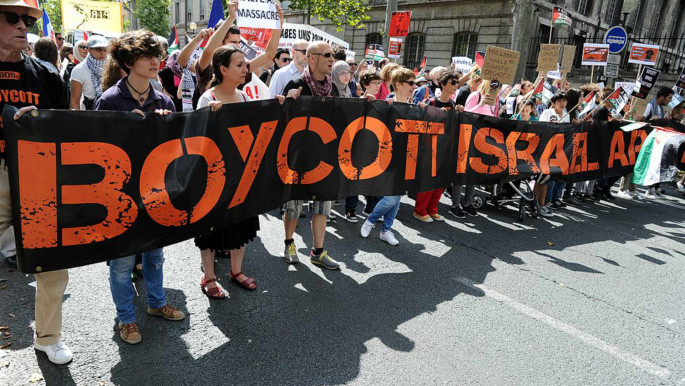 |
|
| Read also: A moral case against normalisation with Israel |
For example, a 2015 research from the Knesset found that Israel's merchandise exports to the European Union had nearly doubled in the 10 years since 2005. However, the BDS points to a 2014 UN report which stated it was a factor behind the 46 percent drop in foreign direct investment in Israel.
There have been countless organised demonstrations that target companies with contracts with the IDF or with companies in illegal Israeli settlements.
Notable successes include multinational firms Veolia and G4S, both of which completely withdrew from Israel after a BDS campaign over its role in Israel's colonisation of Palestinian land. However, G4S denied they withdrew due to BDS pressure.
Other major firms like Unilever and iconic department store Harrods also divested from factories operating in illegal settlements in the West Bank.
Meanwhile, scores of well-known musicians like Roger Waters from Pink Floyd, Lauryn Hill, Brian Eno from U2, Lorde, Lana Del Rey, Shakira and Elvis Costello have either cancelled scheduled performances in Israel or outright endorsed BDS.
 |
It sends a message to the world that artists have a moral obligation to prevent oppressive regimes and human rights violators from using their names to art-wash their oppression and crimes |  |
Barghouti said that BDS appealed to both the consciences and progressive fans of these artists, and that the cancellation of their events in sent a message of solidarity to Palestinians.
"It also sends a message to the world that artists have a moral obligation to prevent oppressive regimes and human rights violators from using their names to art-wash their oppression and crimes," he told The New Arab.
"This obligation would be the same whether protesting crimes against humanity committed by the Saudi and UAE regimes in Yemen, the junta in Myanmar, or the former Sudanese dictatorship in Darfur and elsewhere."
Other famous people that have either cancelled events in Israel or backed the BDS movement include Angela Davis, Judith Butler, Alice Walker, Ken Loach, Alia Shawkat, Archbishop Desmond Tutu, Naomi Klein and the late Stephen Hawking.
However, the BDS has found the most success in universities, with thousands of students globally taking part and establishing offshoot BDS groups in their respective campuses, city or country. A similar success story can be found on social media channels.
Several churches have also divested from companies involved in Israel's occupation, while the Black Lives Matter movement and a growing number of Jewish groups – both within Israel and abroad – have lent their support for BDS.
What are the criticisms?
Some defenders of Israel believe that BDS is racist or anti-Semitic. Many also accuse BDS supporters of double standards, in that they single out Israel and overlook the dictatorships and theocracies of neighbouring countries.
There have also been accusations that BDS supporters make anti-Semitic statements or engage in anti-Semitic activity. Many fear BDS is a step in the creeping normalisation of anti-Semitism, and BDS proponents have been accused of targeting Jewish individuals who have little to no ties with Israel.
Another criticism of BDS is that the movement takes a black-and-white, absolutist approach – something with Barghouti refutes.
"BDS is flexible on tactics yet principled when it comes to advocating for the comprehensive rights of the Palestinian people," he said.
"Our rights under international law are non-negotiable. Tactics to support our liberation struggle, however, must accommodate and adapt to the reality in every context to be strategic and impactful."
Despite this, a report from Israel's Strategic Affairs Ministry – which has been tasked with the counter-BDS effort since 2005 – found that over 30 members of Hamas and the Popular Front for the Liberation of Palestine hold senior positions in some of the NGOs that back BDS.
 |
Barghouti insists that BDS does not target individuals on the grounds of Israeli nationality or Jewish ethnicity and religious belief. He says it targets companies and institutions based on complicity in denying Palestinian rights |  |
The report, from earlier this year, found that the majority have been in prison for terrorism-related crimes, including murder, and maintain active ties with the terrorist groups.
The BDS movement has grown to become one that is diverse and spread throughout the world, so to say the BNC still has full control of it would be tenuous.
However, Barghouti insists that BDS does not target individuals on the grounds of Israeli nationality or Jewish ethnicity and religious belief.
He says it targets companies and institutions based on complicity in denying Palestinian rights. He also says BDS explicitly opposes all forms of racism, and this is why it seeks to end Israel's entrenched system of racial discrimination and ethnic privilege.
In recent months though, several governments around the world have moved to make it illegal to support or take part in BDS.
This has occurred in some US states while Germany recently passed a law which denounced BDS as anti-Semitic. Barghouti said these laws, especially from Germany, placed their democracies at odds with international law and with universal democratic principles.
Does BDS punish artists and Israelis who enjoy culture?
On the BDS website, the BNC states it does not use BDS to target artists. Instead, it targets institutions based on their complicity in Israel's violations of international law.
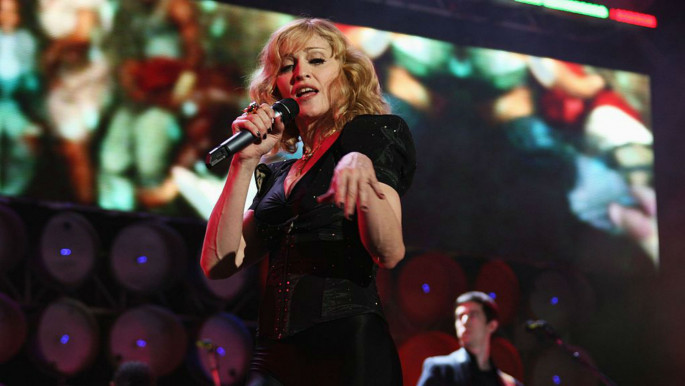 |
|
| Read also: Eurovision: Material Girl Madonna shuns Palestine solidarity |
It believes the state of Israel deliberately uses culture to cover up its crimes and mitigate the damaging effects of its oppression of Palestinians on its global image.
It said it uses culture to "show Israel's prettier face", and has been doing so since the Foreign Ministry launched the Brand Israel public relations project in 2005.
The BNC also states that Israeli artists performing overseas often do so on the back of government funding, while international artists who perform in Israel help to normalise its crimes.
The recent campaign to boycott Eurovision in Tel Aviv is an example of BDS' cultural boycott efforts. While it failed – Israel issued a warning to competing artists that they would be banned if they supported BDS – it garnered much media attention.
Often dubbed the "gay Olympics" due to its large LGBT fanbase and kitsch festivities, Eurovision in Tel Aviv was also viewed as an act of pinkwashing by the Israeli government. A similar call for boycott based on pinkwashing also takes place annually around the time of Tel Aviv Pride.
Read more here: 'Gay Olympics': Eurovision brings Israel's record on LGBT+ rights to the forefront
Why BDS and not dialogue?
On the BDS website, the BNC state that for dialogue between those who are oppressed and those who belong to the oppressors' camp to be ethical and constructive, it must be based on the recognition that all humans are entitled to equal human rights, regardless of identity.
They also believe that dialogue that rejects this fundamental equality and the need for Palestinians and Israelis to work together to end injustice as unethical.
The BNC added that "negotiations" between Israel and the Palestinian leadership completely ignore human rights as it is, and fail to lead to freedom, justice and equality for Palestinians as a result.
While it acknowledged that negotiations will be needed at some point to discuss how Palestinian rights can be restored, the BNC said it could only happen once Palestinian rights are recognised.
Elias Jahshan is an Australian journalist and editor based in London. He is a former board member of Arab Council Australia.
Follow him on Twitter: @Elias_Jahshan
